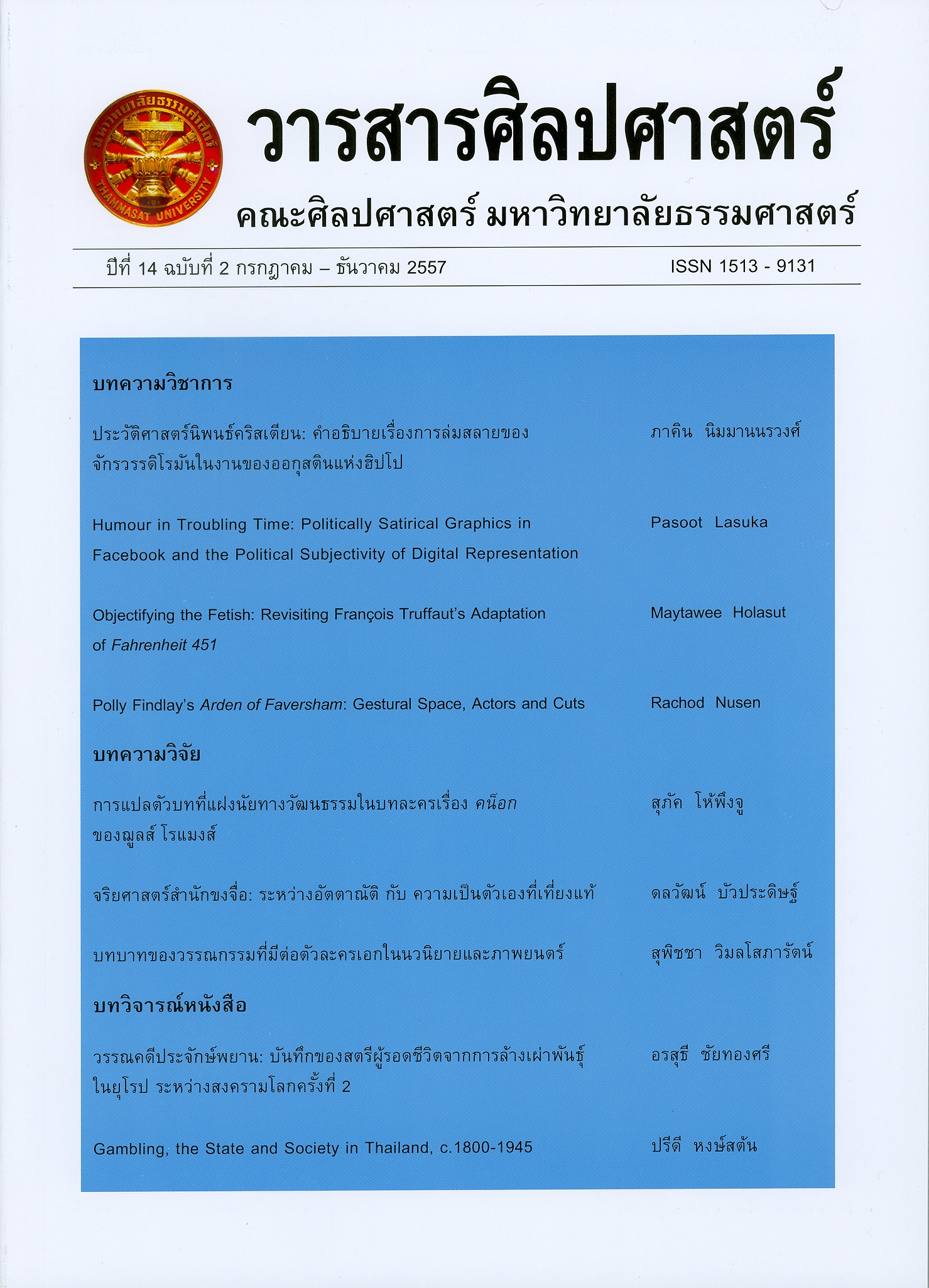ประวัติศาสตร์นิพนธ์คริสเตียน: คำอธิบายเรืองการล่มสลายของจักรวรรดิโรมันในงานของ ออกุสตินแห่งฮิปโป
Main Article Content
บทคัดย่อ
บทความนี้มุ่งศึกษาประวัติศาสตร์นิพนธ์คริสเตียน ผ่านผลงานชิ้นสำคัญเรื่อง De Civitate Dei contra Paganos (The City of God against the Pagans) ของ ออกุสติน สังฆราชแห่งเมืองฮิปโป ภายใต้บริบทที่คริสต์ศาสนาถูกโจมตีโดยบรรดาพวก “นอกศาสนาคริสต์” (Pagans) ว่าเป็นสาเหตุให้จักรวรรดิโรมันอ่อนแอและตกอยู่ในภาวะระส่ำระสายจนกระทั่งต้องล่มสลายลงในที่สุด ทางหนึ่งพวกนอกศาสนาโจมตีว่า คริสต์ศาสนาปฏิเสธการบูชาทวยเทพผู้พิทักษ์จักรวรรดิโรมันและหันมานับถือพระเจ้าองค์เดียว (Monotheism) อีกทางหนึ่ง คนเหล่านั้นตั้งคำถามว่าหากทุกสิ่งที่กำลังดำเนินอยู่นั้นเป็นเทวาลิขิต (Divine Providence) อย่างที่ปรากฏในพระคัมภีร์ของศาสนาคริสต์จริง เหตุใดพระเจ้าจึงยินยอมให้มนุษย์ต้องทุกข์ทรมานและเจ็บปวด ด้วยเหตุนี้ นักประวัติศาสตร์คริสเตียนยุคแรก ๆ นอกจากจะต้องเผยแผ่คำสอนแล้ว ยังต้องทำหน้าที่เป็นผู้แก้ต่างให้กับคริสต์ศาสนาอีกด้วย ในช่วงนี้เองที่ออกุสตินแห่งฮิปโปได้เขียนหนังสือเล่มสำคัญที่แม้ไม่ใช่งานเขียนทางประวัติศาสตร์ แต่กลับมีอิทธิพลอย่างใหญ่หลวงต่อการศึกษาประวัติศาสตร์นิพนธ์ คริสเตียนในเวลาต่อมาอย่าง De Civitate Dei ขึ้นมา ออกุสตินได้โต้แย้งข้อกล่าวหาของพวกนอกศาสนาด้วยการชี้ให้เห็นถึง ความเป็นไปทางประวัติศาสตร์แบบคริสเตียน ซึ่งแตกต่างจากมโนทัศน์ทางประวัติศาสตร์แบบดั้งเดิม (กรีก-โรมัน) และสร้างชุดคำอธิบายเพื่อปกป้องคริสต์ศาสนา พร้อมเชื่อมโยงแผนการของพระเจ้าเข้ากับการล่มสลายของจักรวรรดิโรมันที่ไม่มีวันตาย (Roma Aeterna) ที่กำลังจะตาย
This paper traces a tradition of Christian historiography through the Saint Augustine of Hippo’s magnum opus titled “De Civitate Dei contra Paganos (The City of God against the Pagans)” written in defense of Christianity from the Pagans’ condemnation as a cause of the collapse of Roman Empire. The “Pagans”, on one hand, criticized Christianity for refusing to render worship to Roman deities and for being monotheism. On the other, they called into question why did God allow pain and suffering if everything was hinged absolutely on Divine Providence. The duties of the early Christian historians, therefore, were not only to carry the God message into the world but also to defend Christianity as well. In a sense, Augustine, the bishop of Hippo Regius, wrote the De Civitate Dei which has had a great impact on the Christian historiography. In it, he pointed out the principles and characteristics of Christian history as a turning point of traditional (Greco-Roman) concept of history. He used it against the Pagan’s aspersion, and also associated the Divine Plan with the Fall of Roma Aeterna which was not necessarily eternal.

